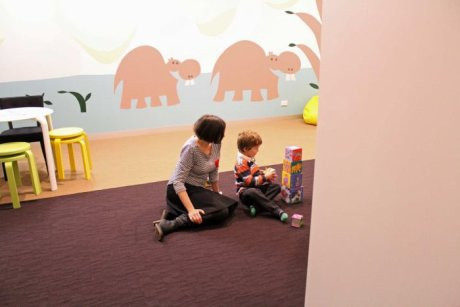
Australian children are missing out on vital early treatment for autism spectrum disorder because of a lag in diagnosis, according to the Australian Medical Association.
Key points:
- Autism diagnosis in Australia often occurs three to four years later than recommended
- The AMA say slow diagnosis means Australian children are missing out on vital early treatment
- Part of the problem comes down to a lack of specialists
The AMA said the ideal age for diagnosing children with the disorder is two but in Australia it often does not occur until a child is five or six years old.
The president of the AMA, Dr Michael Gannon, said early diagnosis was critical.
"There's this concept of plasticity where the interconnecting nerves of the brain continue to form as we develop," Dr Gannon said.
"There's a great deal of evidence that if you can make the diagnosis when it can be made, there will be a lot better outcomes than if you don't make it till five or six."
The AMA said slow diagnosis affected the development of tens of thousands of children, and put pressure on families.
Dr Gannon said part of the problem came down to a lack of specialists who could diagnose more complex cases, especially outside of metropolitan areas.
This year, it was revealed there has been an unexpected increase in the number of children diagnosed with autism, prompting an overwhelming number of families to seek support through the National Disability Insurance Scheme (NDIS).
That unexpected boom blew out budget forecasts for the scheme.
Dr Gannon said doctors are at a loss to explain the cause of autism, or why it is on the rise, but he has slammed critics who blame childhood vaccinations.
"We've done the studies," he said.
"It's got absolutely nothing to do with childhood vaccination, and one of the most distressing things I ever hear is parents struggling with a special needs child, often exhausted and distressed by having one or more children affected — and we do think there's a genetic element to the causation of this condition — being told that they've done something wrong."
The AMA is calling for greater awareness of autism spectrum disorder, and for increased funding to train doctors and improve specialist care.
'She diagnosed him within about two minutes'
The president of political party Dignity for Disability Rick Neagle said he suspected his son Mitchell had autism, but it was misdiagnosed by a specialist.
"We were left in the wilderness for a year or so doing therapies that weren't appropriate," he said.
After Mitchell showed no improvement, Mr Neagle continued pushing for a correct diagnosis.
"I then came across a lady called Professor Robyn Young who has now got international fame for diagnosis and early detection of autism and implementing programs for therapy," he said.
"She diagnosed him within about two minutes, which was distressing initially.
"We had to get our heads down and bums up, so to speak, to implement the rigorous 25-hours-a-week therapy program."
Mr Neagle said awareness, support and diagnosis have all improved considerably in the past decade, but there's still a long way to go.
The position paper was released by the Australian Medical Association today.